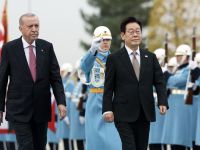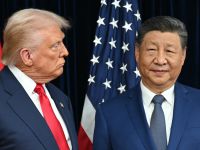OPEC kingpin Saudi Arabia is running an unprecedented campaign to persuade oil producers to reduce world supplies in an effort to prop up crude prices, which have plummeted since the September 11 terror attacks.
Oil Minister Ali Al Nuaimi has been on a shuttle to mainly non-OPEC producers ahead of the November 14 OPEC ministerial meeting in Vienna working to win their cooperation in reviving much-needed market stability.
On Saturday, Nuaimi met in Madrid with his Venezuelan and Mexican counterparts, Ernesto Martinez and Alvaro Silva Calderon, and "agreed on the need to take the necessary measures in the coming days to cut the current output surplus."
The oil minister of the world's leading oil exporter Monday held talks in Moscow with Russian energy officials, who announced a symbolic output cut of 30,000 barrels a day.
Nuaimi has been campaigning for a substantial cut of up to 1.5 million barrels per day (bpd) in a bid to bring the crude prices back up within the OPEC price mechanism band of between 22 and 28 dollars a barrel.
"Our major concern in Saudi Arabia is to ensure price stability," by working with OPEC and non-OPEC members, Nuaimi's advisor, Ibrahim Al Mohanna, said last week, noting that "the global economic slowdown will have an impact on the oil market."
He said non-OPEC members were showing cooperation on this issue.
Nuaimi was also expected to travel to Oslo in a bid to persuade Norwegian officials to slash output to help OPEC efforts.
"I believe Saudi Arabia is pushing strongly to have OPEC cut output by 1.5 million bpd. If OPEC approves this, non-OPEC producers will most likely help," said Abdulwahab Abu-Dahesh, chief economist of Riyad Bank.
"The kingdom's policy has always aimed at achieving stability in the oil market at all times to ensure a healthy economy. Now, it needs even more stability to finance economic reform programs," Abu-Dahesh told AFP.
Like other oil-rich Gulf monarchies, Riyadh depends on oil revenues for more than 80 percent of its income.
An excess in supply because of production over quota by some OPEC members, which has now declined, and less enthusiasm on part of non-OPEC producers to cut output, could delay any instant effect for a possible OPEC cut, he said.
"The issue is not only acceptance, it is rather the compliance (which matters)," Abu-Dahesh said.
Nuaimi, Martinez and Calderon concurred in their meeting that "despite producers' efforts to restore balance to the market, supply greatly exceeds demand, not only because of lower demand but also due to an increase in the output of non-OPEC producers," it said.
Oil majors Saudi Arabia, Venezuela and Mexico are the largest exporters to the United States. Their 1998 agreement to slash output boosted oil prices, which had fallen below 10 dollars a barrel.
The ministers concluded that "the current state of the market and forecasts of demand in 2002 require a special (effort) to prevent an aggravation of the imbalance on the market.
"The real problem is that world demand for oil is forecast to be weak, and uncertainty is high. I believe if cuts are made, prices will crawl back to reach 22 dollars by the end of the first quarter of next year," Abu-Dahesh predicted.
For the first time in two years, crude prices had slumped under 20 dollars a barrel amid growing global recession fears since the September 11 terror attacks on the United States.
But prices rebounded to more than 21 dollars at the end of the week.
OPEC ministers were expected Wednesday to cut output by one to 1.5 million bpd, possibly from as early as December 1, according to sources at the cartel's Vienna headquarters -- RIYADH (AFP)
© 2001 Al Bawaba (www.albawaba.com)







